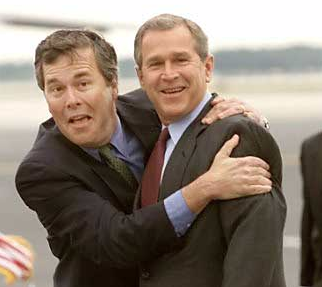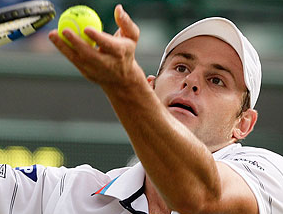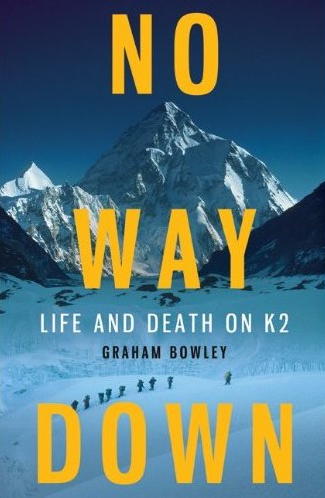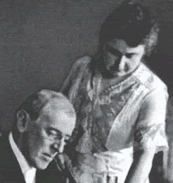Scary Science Gibberish: Sharks Making Monsters In Their Stomachs!

There’s nothing quite so wonderful as an alarmist science scandal-you know, the kind of thing that sounds really really bad but you don’t really know why? And we get a lot of that, because sometimes the wonderful people at National Geographic are basically the TMZ of science and animals. Because: Sharks Carrying Drug-Resistant “Bacterial Monsters! SHARKS! Monsters! The coming plague! Sharks carrying monsters in their little fins! Or, um, sharks are making a heady brew in their stomachs of drug-resistant thingies! “Though sharks aren’t a staple in the human diet, we eat what they eat-crab, shrimp, and other fish. So people should be aware of these risks and handle food appropriately to avoid infection”! Oh my God, I’m so scared now! Of something, but I’m not sure what exactly! (via)
Your Choices In 2012: Bush-Fiorina, Bush-Whitman or Bush-Haley

So let’s say this is how it goes down. Jeb Bush has the south locked up, right? Florida already is one of the big four states, with an expected 28 electoral votes after the census. Texas might have as many as 38, but obviously that’s a done deal for a Bush. John McCain’s not running, even if he’s still standing. Everyone hates Mitt Romney. Then there’s… uh… Eric Cantor? Oh, excuse me, how did the bottom of the barrel hit me in the nose so soon? And Mike Huckabee has already been vigorously throwing Jeb Bush’s name around on the air for ages now, so there’s 1. him out and doing TV and 2. his weird very Democratic yet super-McCain-voting state. (Okay, whatever, a mere 6 electoral votes.) Now, running mate! Since California and New York’s 85 or so are Democrat for good, that’s a big block you have to take down by getting, well, every single other state, right? And he needs a ton of cash. The cash burn on this puppy will be unprecedented-it’ll make Hillary Clinton’s campaign look like a bunch of fiscal spending conservatives. Seeing as there’s no way the actual real Republican party is going near that Sarah Palin chick, plus she has the highest negative name recognition since, um, anyone named “Bush,” plus she really doesn’t have a good money base, that’s not it. So what does a Republican ticket need to partner Bush with? A lady, because it’s fashionable now and to neutralize both Palin and Clinton, who will be out on the road campaigning. So basically you just decide who’s less wacky at the time: Carly Fiorina or Meg Whitman. As long as it’s someone who helps get him Indiana and Ohio, North Carolina and Virginia. We’re going with Meg Whitman. Oh God, wait! Nikki Haley! She’s got money, and Palin will campaign for her. Boom. Done. BUSH III. Believe it.
Struck By Lightning, Mauled By Bear
“The probability is infinitesimal. The closest approximation is certainly zero.”
-UNC statistician Ross Leadbetter on the chances of being both struck by lightning and mauled by a bear. Meet Rick Oliver, the North Carolina minister who defied the odds and managed to experience both of those things.
Julia Gillard, Australia's New Prime Minister: Fulfilling Germaine Greer's Dream
Some amazing news from Prison Island which will have disgruntled Hillary supporters wishing we lived in a parliamentary democracy: Less than three years after he led his Labor party out of the political wilderness, Kevin Rudd has been replaced as Prime Minister of Australia by his deputy, Julia Gillard. While Rudd’s ouster is more a case of internal politics in a Labor party that always liked him much less than the voters did, Gillard is still the first woman to hold the office, and in macho Australia, that’s kind of a big deal.
The Australian’s Caroline Overington expresses the joy of the ladies on Prison Island and puts it in context.
We texted each other, saying: “Woo-Hoo!” and “Yee-ha!”
Then, too, we looked back, toward the generation that made it possible, the women who fought through the late 1960s and early 1970s for the right to keep working when they got married or pregnant; who refused to get married, or if they did, refused to take their husband’s name; who chose not to have children, or else to have children, without bothering to put on the white dress; who ditched the promise “to obey”; who argued with their husbands over who had to do the dishes, and vacuum the floor and pick up the children; who took mortgages in their own names, and voted for whom they pleased; and travelled solo; who battled their way into university courses, and soon were topping them.
They got called names — hairy feminists, ragged dykes, frigid moles, you name it — and it hurt, but they kept going.
Also worth noting: Hillard’s partner is a hairdresser named Tim, who seems like a pretty cool guy. Anyway, interesting stuff all around. I guess the lesson here is don’t mess with Robin Williams.
Simon Rich and How Many Books You Need to Sell to be a Success

Gawker’s Richard Lawson wrote today about being against being oh-so-outraged by nepotism, triggered by the longstanding freefloating ire among some folks regarding Simon Rich. (Unfamiliar? Simon Rich was born in 1984, to Times columnist Frank Rich, went to Dalton, was Harvard ’07, edited the Lampoon, is published in the New Yorker, writes for “Saturday Night Live,” is cute and shaggy and just sold the rights to his first novel (and his third book!) to director Jason Reitman. Sure! It’s like a recipe for resentment!) Lawson concludes: “It’s not that they got the wonderful opportunity, the secret passage through the back door. It’s that we didn’t. And that just makes us seem a little petty and insecure and, in a strange way, vain. It sort of implies that the only thing standing in our way is a lack of access.” That may be true though! Lack of access is the number one path to failure. (That’s why people move to New York.)
Okay, sure, young Mr. Rich has a pretty successful resume. But he’s working in a very competitive field and it’s gotta be stressful. I couldn’t do the things he does (up to and including graduating from Harvard; no way would I have made it through that).
And let’s look at the nitty-gritty. Playing the “he sold x many books” game is always a fool’s errand, we should first acknowledge. There is only one reason we’re indulging in it here: the point being that there is nothing to be jealous of when someone sells or publishes a book. The publishing industry is very wacky! All kinds of crazy people sell books! You too can be one. And publishing a book is often a terrible, ugly process, and after all that, you are forcibly reminded that nearly no one buys books.
But people get a little crazy also anyway when someone publishes or sells a book. Because we’re people who like books, really like them, sometimes we get confused, and start thinking this means that the book-selling person is elevated in some way or has arrived or is famous. That is incorrect.
So. According to Nielsen BookScan, which disclaims always that it reports about 75% of book sales (because it excludes WalMart and Sam’s Club), Simon Rich’s first collection, Ant Farm: And Other Desperate Situations, from 2007, sold 21,000 copies, which is pretty amazing! [N.B.: This originally said 25,000 copies, which was a typo; the actual figure is 21,000.]
His second collection, Free-Range Chickens, from 2009, sold 2000 in paperback and 4000 in hardcover.
And his novel, Elliot Allagash, the one that he just sold to Reitman and which was published in hardcover this May, has sold 1000 copies.
You can go to a Kinko’s today and publish your book and get a thousand people to pay you for it. Except you’ll make money per copy! Because you won’t be paying back an advance! And you won’t have to go to marketing meetings! You’ll just start a Tumblr or something! Resent not. Go have some fun. Finish your stupid novel tonight!
Photo of Simon Rich by Adrian Kinloch.
Young Knifecrime Island Pot Seller Too Organized For His Own Good
“Sell push bike, go on the rob, sell weed, get a job.”
-The to-do list found by police in the pockets of Thomas Franks, a 19-year-old from West Sussex, England. In their search of Franks the police did indeed also find weed. The young man, who “said he wrote the list to himself because he was ‘desperate for money’ to fix his PlayStation games console and needed to structure his day,” plead guilty to possession with intent to distribute.
Wimbledon Blogger Forced to Tennis-Blog For Ten Hours

An exhausted liveblogger was just forced to blog for ten hours. Xan Brooks, of the Guardian, was barely keeping it together.
“9.10pm: Is it over? It is not over. For a brief moment back then, I thought it was over.”
“8.40pm: It’s 56 games all and darkness is falling. This, needless to say, is not a good development, because everybody knows that zombies like the dark.”
“8.20pm: Wow, is that really the time? I must go home; can’t think what’s kept me. Wa-ha-la-ha-la-ha-la!”
Good news though! Liveblogging was finally canceled due to darkness. Bad news: there’ll be more tomorrow.
Six Minutes in Heaven: Graham Bowley, 'No Way Down'
by Evan Hilbert

Ways to die on a mountain: trip on a piece of ice; fall into a crevasse; lose your mind and wander the wrong direction; remain at high elevation for a sustained period of time; fall asleep; also, GET TRAPPED ABOVE AN AVALANCHE. Graham Bowley’s No Way Down is blurbed as “an Into Thin Air for a new century,” which is marketing whatever, and oversimplification of both works. Into Thin Air is a thrilling reported memoir told by Jon Krakauer after his disastrous Everest expedition. No Way Down is a reported story, borne from an article Bowley wrote in the Times two years ago. Bowley did not spend a second on the snowy, deadly cliffs of K2, in the expedition in August of 2008 during which 11 climbers died.
Instead, he uses an outsider’s perspective to tell the story of a group of climbers making a terrifying trip to the top of the world’s second-tallest mountain. Bowley’s reporting allows for a linear narrative explaining — nearly as possible — exactly what happened on K2.
We talked for six minutes.
Why do people climb mountains?
I think for many different reasons. On K2 I came across people who were doing it to escape their other life, escape their responsibilities —
Like a drug?
For some people it is. They do love that mountain and the escape, and I felt that myself when I went there last year. This summer, as the season has come around again, I really want to get back to the Karakoram. It’s very magical.
There was this married couple — -Cecilie and Rolf — -who could be together in the mountains, and that’s where they lived their lives. They were really interesting. It’s for achievement. It’s for patriotism. There was one guy — -Gerard McDonnell, a fabulous guy — -who died. He was there for himself, for his family back home and for Ireland.
I understand the escape and I understand the challenge, but is K2 a target because of the danger? Does that make it more appealing?
I think there are mountains, but K2 is special to certain mountaineers. While Everest has been overrun by the crowds, which it has, K2 has retained its mystique. It’s more remote than Everest — -it’s harder to get to. You have to go through Pakistan and trek for six days. It’s much further out. And then, when you get there, it’s deadly! So, people don’t go there. Only the really good mountaineers go there.
How did this go from a piece in the Times to a book?
I was sitting on the foreign desk when I wrote the story, and I went to Gerard McDonnell’s wake in Ireland and I saw a similar bewilderment amongst his family about why he had done this, why he had thrown himself on this mountain thousands of miles away. It raised all of these questions that I wanted to answer. So I set off to interview the survivors — -as many as I could — -and they kindly let me into their lives and the families of the people who died. What did they think? Why did these people do this? Why did they go to K2? You’re right: What is it about K2 that drove them there?
Obviously you deal with very heavy subject matter, I mean, lives ended in this book. Do you fear any sort of criticism from survivors since you weren’t on the mountain?
Yeah. I’m not a mountaineer, so I had to work really hard to overcome that. Many people were really welcoming. They wanted to tell me and help me understand. I also had to work hard, but I relied a lot on their kindness and openness. I went to France to visit Hugues d’Aubarede’s family for three or four days. It was really hard to begin with and they were quite skeptical, but I had to convince them that I was a reporter and that’s what I was bringing to this story. A real independent and an outsider’s perspective that wasn’t biased — -you were right to point that out at the beginning — -who could do their story justice.
Are you concerned about experiencing a similar backlash to Krakauer?
Yeah, I hope not. I really do. There were some negative aspects in there, but I really reported it out. I spoke to everybody that I could. So I really tried to pin down the story. I had to choose a certain point of view, and I varied that through the book. When you do that, you cut out other people’s stories. That’s a problem, because there are multiple stories here. But I tried to capture the most important moments and tell the main stories.
Since you’ve written an entire book here, I’d guess you’re extremely confident that the narrative put forth is the nearest thing that happened up there. But would you still concede that there could be varying stories? That maybe you didn’t get it all right?
I think that’s entirely possible. I think I can only tell a story as good as the story told to me with my reporter’s notebook. I spoke to many people, and I discounted some of the things that people told me. I would go back and double check and triple check to try and get a democratic point of view of things. There is a big portion of the book where it is just one person, and I had to dramatize that person’s journey on the mountain. Yeah, they were affected, and I’m sure I got things wrong. All I can say is that I tried to bring the highest degree of reporting standards to it, and there were lots of things I left out when I wasn’t confident that it was right.
Evan Hilbert really likes books about sports. Do you know any good new or forthcoming books about sports? Tell us, and we will spend six minutes with their writers too!
Horror City, "Pain"
Horror City, “Pain”
Very exciting news for rap music fans of a certain age and temperament and affinity for the work of De La Soul or Grave Diggaz or Handsome Boy Modeling School: The great, great, funny, weird, soulful, thoroughly lovable Amityville, Long Island producer Prince Paul has just made public (and for free!) a full album’s worth of material he made with a local MC named Superstar in 1995. The project, which went under the name Horror City, never found a record label, and Paul ended up using some of the beats on his wonderful, star-studded 1999 album A Prince Among Thieves-a “hip-hop opera” that is among the great concept albums ever made. (And not nearly well-enough known.) But now, the original tracks, unearthed. Here is a sort-of medley video Paul made for Prince Among Thieves.
Awesome!!!
Was Woodrow Wilson Completely Incompetent?

Oh, we talk a lot of smack about Ronnie Reagan. But Woodrow Wilson? Paranoid, suspicious, raging; his wife fired anyone who suspected him of being incompetent. And according to the biographer of his marriage to Edith Wilson: “ I just found it so unbelievable that they would have toyed with the fate of this country, the welfare of this country, these two irresponsible people, certainly this lady was…. She was probably a very limited woman, intellectually. I’m being very kind. She wasn’t a very educated woman. And she was a very vain woman.” Oh, Errol Morris, you are rocking my world.
